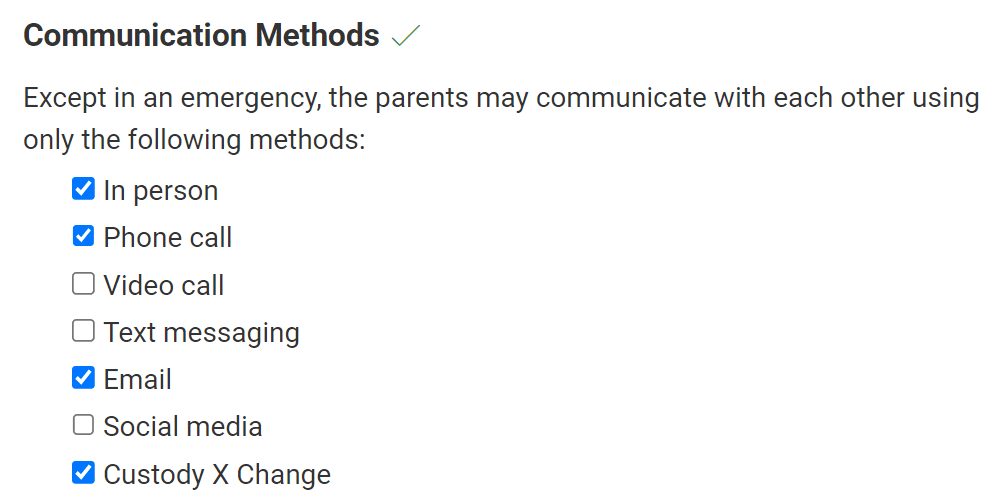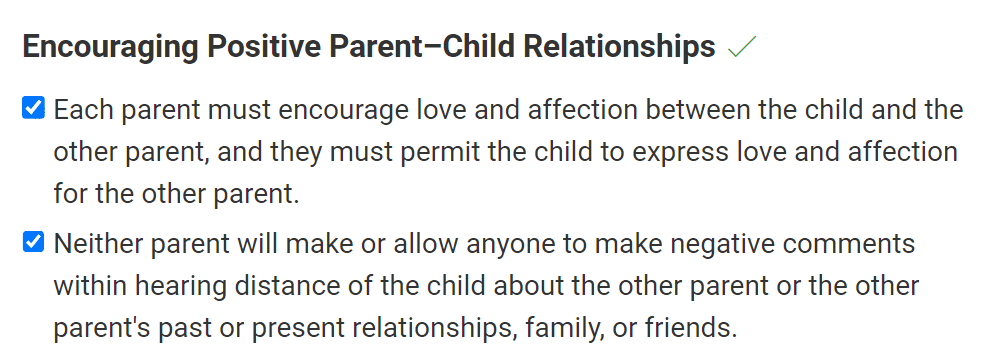How to Co-Parent With Someone You Still Love
You may have had a meaningful relationship with your child's other parent, or thought you did, or wish you could. Unfortunately, if your child's other parent doesn't want to be with you, you can't be together. You'll have to find a way to move forward.
Prioritize what you need to do as a parent. The relationship with your child's other parent may never be what you hope for. But you'll have some contact with them on matters relating to your child, and you can do so calmly and respectfully.
Avoiding pressure to get back together
Pressuring someone emotionally isn't fair to them. It isn't fair to yourself, either. Would you want someone to stay with you only because they pitied you, feared you or were reluctant to disappoint you and couldn't figure out how to walk away? Moreover, it's unfair to your child to have their parents stuck in that dynamic.
Financial or logistical pressures — like incomes, locations or caregiving responsibilities — can bind co-parents or ex-partners at least temporarily. You may be willing to help each other related to your jobs, housing or disabilities. If your child is better off staying in one home, you may take turns there, called birdnest parenting. But just because you support each other in certain ways doesn't mean it's a good idea to rekindle a romance.
Don't cling to false hope. Keep the big picture in mind. Gain insight into your real motivations — yours and theirs — and anticipate likely outcomes.
Trying therapy (together or separately) after a breakup
Counseling can help people discuss what happened, forgive each other, and learn to communicate and treat each other better. A therapist often asks participants to explain their goals at the outset so the conversations can be productive.
If both exes are open to reconciling, a couples therapist can help them with that goal. Some divorced or separated co-parents have always been in love, or fall back in love, and they sometimes get back together when they process their issues.
But if one of them is firmly opposed to getting back together, no one (including a therapist) should pressure them otherwise.
Co-parents who don't intend to reunite can also go to therapy together. One or both of them may just want closure on their past. Instead of "couples therapy," this might be called family therapy, breakup therapy or divorce counseling. It can help you begin to approach co-parenting with an ex you still love.
Another option is parenting coordination, which focuses on helping your parent together.
You can also go to mediation to negotiate a compromise on a specific conflict. This solves the dispute on a practical level, not necessarily an emotional level.
Don't drag out counseling just because these sessions feel like an intimate emotional connection you have with your ex. Pay attention to signs that it's time to end your joint therapy sessions and move on. You can always continue therapy on your own.
The other parent's right to walk away from you
You can't make someone be in a relationship with you. Each person has control over their own body and choices.
If you married or entered any other legal agreement to define your relationship, you have certain rights and responsibilities within the relationship.
In no-fault divorce, it's enough that one spouse wants to end the marriage. This is an option in every U.S. state, Canada, the U.K. and Australia, usually after a minimum required period of separation. Neither spouse needs to prove wrongdoing.
Both parents' rights regarding your child
Once the baby is born, your parenthood is assumed (if you're the biological mother or you're the mother's spouse) or else your parenthood can be established, sometimes through a paternity test. A father's rights are limited during the pregnancy. If you're not the one who's pregnant, you don't have control over the pregnancy.
Parental rights include the right to seek joint or sole custody, visitation and child support. Parenting is a major responsibility, and you have to obey court orders.
You can't let go of being a parent; instead, lean into it.
Letting go of someone you love and still co-parenting
You may always love your co-parent. That's a good thing if it means you respect and appreciate them.
But it also means you have to accept their choice not to be with you. Maybe they felt you were never a couple; they're not required to start a relationship with you. Maybe you were definitely a couple; they're not required to stay with you. Whatever their reasons for not wanting to be with you, and whether it makes sense to you or not, it's what they're choosing.
You can give yourself time alone. You can date other people. You can spend time with family and friends. You can develop your career or your hobbies. Above all, you can commit to being a great parent.
Over time, you'll find the emotional space to move on from a relationship that couldn't work out or wasn't meant to be.
Clarifying your future by writing a parenting plan
Focus on what you need to do for your child. If you haven't already done so, define your co-parenting responsibilities in a document called a parenting plan. Figuring out how to co-parent with someone you still love can be complex, so take this opportunity to reflect. The other parent can give input too, and a judge will decide.
Here are a few examples of what you can do with a parenting plan.
Set expectations for reimbursing expenses
It's common for co-parents to make back-and-forth demands with money, even for small amounts. One of you may just be seeking an excuse to talk about anything at all. But these conversations won't satisfy you emotionally and might harm your child financially.
Make sure you have a plan for how you'll split important costs (like your child's health insurance) as well as smaller costs. Then you can let go of these arguments.
 You can customize this with Custody X Change.
You can customize this with Custody X Change.
Establish a routine with boundaries
Specify at whose home you'll pick up and drop off your child, who will look after their clothes and belongings, and when and how it's OK to message each other. This will help you avoid overstepping personal boundaries.
 You can customize this with Custody X Change.
You can customize this with Custody X Change.
Be respectful to move forward
You may be disappointed that the romantic part of your relationship is over, but don't let your child overhear opinions that can confuse them or turn them against their other parent. Commit to respecting one another and encouraging your child to love both of you.
 You can customize this with Custody X Change.
You can customize this with Custody X Change.
Using an app to organize your parenting plan
Writing a parenting plan can feel overwhelming. While respecting your co-parent's boundaries, you need to propose to the court how you'll work together to care for your child.
Fortunately, Custody X Change empowers you to do this.
The Custody X Change app walks you through each step of creating a comprehensive parenting plan. And it allows you to create a parenting time schedule from templates or from scratch.
The many co-parenting features — including an expense tracker and parenting journal — equip you to secure your child's well-being as you plan a new future.
The easiest and most reliable way to co-parent is with Custody X Change.
